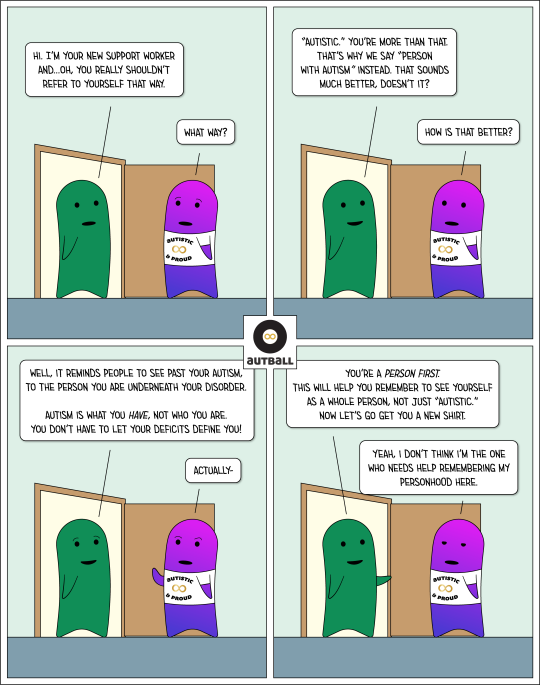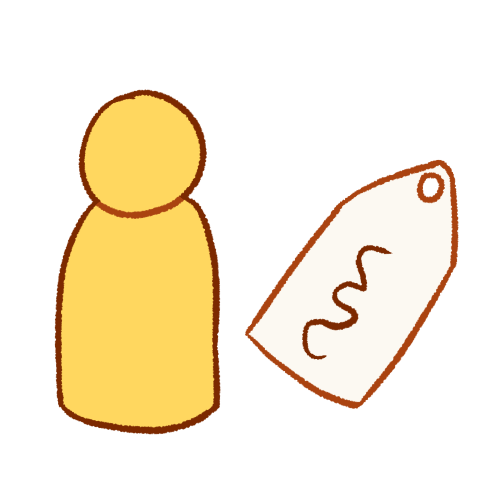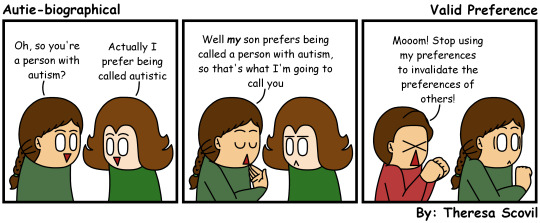#person first language
Text

It seems like we “individuals with autism” wouldn’t be treated as poorly as we are if person first language did what they think it does.
(For more: https://ausometraining.com/identity-first-language/)
#autism#autistic#actually autistic#autistic problems#autism acceptance#person first language#identity first language
431 notes
·
View notes
Text
#poll#polls#autism#actually autistic#actuallyautistic#person first language#identity first language#autist#reclaimed words#reclamation#ableism#people with autism
106 notes
·
View notes
Text


IDs in alt
wanted to draw but needed something simple to do, so here's symbols for 'identity first language' and 'person first language'
#emojis#custom emojis#disability emojis#neurodivergent emojis#petrichoremojis#nouns#phrases#Cecil's tag#identity first language#person first language
25 notes
·
View notes
Text
#actually psychotic#actually schizospec#schizospec#mental health positivity#mental heath support#schizophrenic spectrum#schizo spectrum#disability pride#mad pride#actually neurodivergent#person first language#identity first language
68 notes
·
View notes
Text

The majority of us prefer to be called autistic, but there are those who prefer being called a person with autism. However, just because you know someone who prefers being called a person with autism doesn’t give you a pass to call all of us that.
#autiebiographical#autie-biographical#actually autistic#autism#autistic#identity first language#person first language#comic strip#web comic#comic#slice of life
280 notes
·
View notes
Text
HAVE YOU EVER SEEN SOMETHING THAT ALMOST MAKES A GOOD POINT?

I AGREE WITH MOST OF THE STUFF BEING SAID, BUT I THINK IT'S IMPORTANT TO ASK THE INDIVIDUAL WHAT THEY WANT TO BE REFERRED TO.
IF A PERSON WANTS TO BE CALLED "NONVERBAL" OR "PERSON WITH AUTISM" OR "DIFFERENTLY ABLED" THEY SHOULD. THAT'S THEIR RIGHT AS THE HOLDER OF THEIR AUTISM.
ASK BEFORE YOU REFER. MAKE YOUR PREFERRED AUTISM REFERRAL LANGUAGE KNOWN TO OTHERS.
#NO HATE TOWARDS THE PUNK ROCK AUTISTIC EITHER#autism#actually autistic#neurodiversity#actuallyautistic#ASC#person first language
269 notes
·
View notes
Text
How do yall feel about person first vs identity first language?
I personally like id first because the whole point of person first to separate the person from being disabled, which 1. Not everyone wants 2. Makes it seem like being part of the disabled community is bad, 3. Disabled people tend to be blunt af anyway, we don't beat around the bush with our wording because if we do, we've learned that ppl wont take us seriously (like drs)
Like if a specific person preferred one way over the other i wld respect it, but as for the whole community like ?? Person first language feels like abled non-sense.
#disability#disabled#spoonie#chronic illness#chronically ill#chronic pain#person first language#identity first language
144 notes
·
View notes
Text

[image description: a section of a tweet reads, “I've worked with adults with disabilities for close to 10 years and the standard is people first language I.E Person with autism.” /end of image description]
It’s so fun when someone who “works with” disabled people tells disabled people what they should be called. Paternalism is the bestest thing ever.
This doesn’t just happen online.
In my second year as a social work major, I said “I’m bipolar” to one of the graduate program’s professors. He said “you have bipolar disorder, you are not your diagnosis” and wouldn’t let me object. I had it happen in treatment as well.
Telling me what I was allowed to call myself did not make me feel empowered in the slightest, it did quite the opposite to be honest. It allowed my sense of self to erode so completely that I could not advocate for myself when I was “kicked out” of the major for being bipolar.
#stigma#autism#bipolar disorder#person first language#neurodivergent#neuroatypical#ableism#mental illness#mental health stigma#mental health
52 notes
·
View notes
Text
Disabled Artist Journal.
12/11/23.
***
Being Disabled is integral to my life experience. After a lot of growth and healing with my community, I’ve come to a place of pride about it.
But I want to take a moment to say “thank you” to the people in my life who don’t make it everything.
Ignoring it is no less cruel—that’s ignoring the mountains of bullsh*t we have to navigate each day—and I’m identity-first (capital-D “Disabled”), not really about “person first language.” (Won’t go on a long soapbox about it, but TL;DR—PFL has its advantages, i.e. discouraging dehumanization, but ultimately works against the social and economic models of disability imho.)
But the people in my life who think of me as a writer, a geek, a loved one, an artist, a theatre person, queer person, a friend, etc. first—who consider my identity, but who give me the space to be everything I am, not just stopping at “Oof, wheelchair”—
Most of the world doesn’t hold that space. And I want you to know…
You mean a lot to me.
❤️
#disability#disabled#disability representation#disability rights#cripple punk#cripple posting#social model of disability#economic model of disability#ableism#lgbtqia#artist#writer#person first language#identity first language#discussion#us politics#friendship#relationships#disability pride
5 notes
·
View notes
Text
please give your two cents in the reblogs or tags id love to hear it!!!
edit- I FORGOT ONE NO
6 notes
·
View notes
Text
I hear some of those able-bodied people who say we shouldn’t be called “disabled.” We should instead say “differently abled” or “person with a disability.” To the world I offer a new euphemism but one that feels more correct for me: a person that comes with accessories.
I’m the friend that comes with disclaimers and mobility aids and unexpected accommodations! I’m the special edition person 😃
#disability#person with disability#person first language#debate#new word#person that comes with accessories#new and improved
15 notes
·
View notes
Text
Spoiler Alert: It Was about Self-Determination All Along
One of the core aspects of the Disability Right Movement, arguably the core aspect, is the ability to make one’s own decision about their life. Many seem to not understand that.
For example, the person-first vs. identity-first language debate almost always misses that PFL very much has a specific history behind it. It originated in the self-advocacy movement. People with intellectual and developmental disabilities who lived in institutions were used to be reduced to nothing more than their disability. They wanted to be seen as people. Being called “disabled” made them feel like a unperson. They didn’t have control over their own lives because of where they lived. There are certain treatments and settings that inherently do not allow for this to happen. Institutions are one of those. So they started organizing, creating an organization called People First among others. It is still called People First. The Deaf and Blind communities were already organizing before this. They largely preferred to be called Deaf and Blind.
The Neurodiversity Movement came to fruition in the early 1990s. This was after the Self-Advocacy movement was established. There are numerous attempts to separate neurodivergent people from their disability by professionals. This include autistic people. Autistic people who organized during the early days of the Neurodiversity Movement largely decided they preferred to be called autistic rather than people with autism. Even now, when people use IFL, they are often corrected to use PFL instead. This is wrong. It does not respect someone’s ability to refer to themself the way they want to. Hence, it does not respect self-determination. It is also wrong to tell someone, who has decided for themself, to use PFL, that they can’t do it. It makes very little difference which one someone uses. The only reason why there is even a debate is because of the power struggle that has happened as a result of the different disability subcultures and how people in the out-group enforce it on the in-group. Professionals took the person-first doctrine from the Self-Advocacy Movement and decided that it was the only language anyone should ever use. This uses one piece of the Self-Advocacy Movement while betraying another, that being self-determination. It may be a purposeful co-option.
It doesn’t stop at language preference. At it’s best, disability advocacy isn’t about whether someone is disabled by personal impairments or by society (both can be true), or if what they have is a difference, disorder, or disability, it’s about someone being able to live an autonomous life and be free of neglect and mistreatment.
21 notes
·
View notes
Text
i love you schizophrenics i love you psychotics i love you oppositional defiants i love you autistics i love you manics i love you dyspraxics i love you systems i love you survivors i love you psychopaths i love you amnesiacs i love you reverts and regressors i love you mad people i love you!
#NO NEGATIVITY#also if ur one of these people and arent feeling this post that is absolutely valid#person first language#disability#disability positivity#mad positivity#nd#ndd#neurodivergence#radical inclusivity#i love you x#mine#sending my love i hope you have a peaceful and enjoyable day
41 notes
·
View notes
Text
A person who can’t just call autistic people autistic is a person autistic people can’t trust, and a person who should never ever be permitted to be in a position of any authority over autistic people or to work with autistic people in any professional capacity.
If you’re a non-autistic person who’s accustomed to using person-first language or euphemisms, put yourself to the test. Start calling autistic people autistic. If it’s easy for you to make the switch to calling us autistic, that’s excellent. You’re now one more voice refusing to perpetuate autistiphobic language and the autistiphobic attitudes and fantasies associated with such language. Thank you.
And if it’s hard for you to discard the person-first language and the evasive euphemisms? If it’s hard for you to start calling us autistic? If you find yourself resisting the change, making excuses, having trouble just saying or writing the phrase “autistic people”? Well, now you’ve learned something important about yourself, and you have some work to do.
-- Dr. Nick Walker (she/hers), in her article on person-first language.
11 notes
·
View notes
Text
People with disabilities are the world's largest minority group, with about 15% of the global population being disabled. The word "disability" itself is very broad, and ties together many varied lived experiences.
This disability pride month, keep in mind that the words people use to talk about their disabilities depends on the person, as well as on the specific disability they are living with.
One aspect of this is the preference for identity-first language or person-first language.
Identity-first language means that when speaking or writing about an individual or group, you lead with the identity.
Examples:
autistic person
Deaf adult
chronically ill peers
bipolar student
disabled people
Some communities tend to prefer identity-first language, especially when the identity in question is heavily linked to how a person in that group interacts with and experiences the world. Identity-first language is very common in Deaf culture, the blind community, and the autistic community. I have personally seen identity-first language used a lot by people with invisible disabilities.
Person-first language means that when speaking or writing about an individual or group, you put the person before the diagnosis.
Examples:
person with an intellectual disability
people with AIDS
child with cerebral palsy
peers who have schizophrenia
people with disabilities
people who have disabilities
Some communities tend to prefer person-first language, especially when the community has history of severe dehumanization and marginalization. Person-first language is very common amongst people with intellectual and developmental disabilities.
Even if a certain community tends to use one model over the other, it is always up to the individual what words they use for themselves, and what words they want others to use when talking about them.
#disability pride month#disability pride#identity first language#person first language#there's obviously a lot to be said on this subject but i tried to keep the post succinct#some people prefer 'person living with a disability' over 'person with a disability' or vice versa as well
3 notes
·
View notes